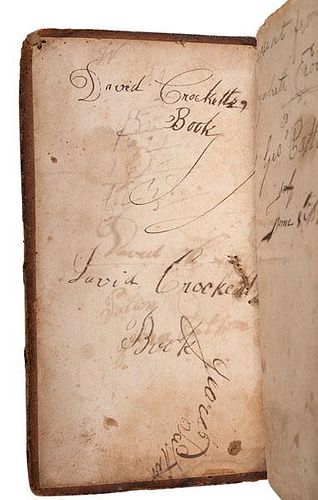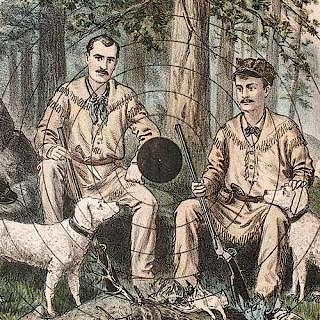Medical Book Owned by Davy Crockett, "Domestic Medicine Book, Treatise on the Prevention and Cure of Disease," Dr. William Buchan, 1828
About Seller
6270 Este Ave.
Cincinnati , OH 45232
United States
With offices in Cincinnati, Cleveland and Denver, Cowan’s holds over 40 auctions each year, with annual sales exceeding $16M. We reach buyers around the globe, and take pride in our reputation for integrity, customer service and great results. A full-service house, Cowan’s Auctions specializes in Am...Read more
Two ways to bid:
- Leave a max absentee bid and the platform will bid on your behalf up to your maximum bid during the live auction.
- Bid live during the auction and your bids will be submitted real-time to the auctioneer.
Bid Increments
| Price | Bid Increment |
|---|---|
| $0 | $25 |
| $500 | $50 |
| $1,000 | $100 |
| $2,000 | $250 |
| $5,000 | $500 |
| $10,000 | $1,000 |
| $20,000 | $2,500 |
| $50,000 | $5,000 |
| $100,000 | $10,000 |
About Auction
Nov 20, 2015 - Nov 21, 2015
Cowan's Auctions dawnie@cowans.com
- Lot Description
Medical Book Owned by Davy Crockett, Domestic Medicine Book, Treatise on the Prevention and Cure of Disease, Dr. William Buchan, 1828
Buchan, William, M.D. Domestic Medicine, or, a Treatise on the Prevention and Cure of Diseases, by Regimen and Simple Medicines; with Observation on Sea-Bathing, and the use of Mineral Waters. To Which is Appended a Dispensatory for the Use of Private Practitioners. Exeter: J. & B. Williams, 1828, 22nd ed. 8vo, leather, 495pp plus Appendix and Index, xl. On front pastedown and free endpaper are notes indicating David Crockett's book. Ffep note Presented from Elizabeth Crockett to Geo. Patton June 8th, 1831.
David "Davy" Crockett was born in northeast Tennessee (now part of Greene County, then part of North Carolina) in 1786. The family moved around the area as the family struggled to make ends meet in what was then the frontier. At the age of 12 young David was indentured to help with the family's debts. It did not work out well, and the young man returned home. At various times attending school and taking on odd jobs, many involving cattle drives or work as a teamster, David helped the family as he could. He later apprenticed with a hatter in Christiansburg before returning to his father's tavern. He hired out to pay other family debts, returning to one of his father's creditors where he worked for four more years.
While there, he fell in love with Amy Summer and Margaret Elder, both engaged to other men. He then met Polly Finley at a harvest festival and determined to marry her with or without her family's approval. They did marry in August 1806, her family approving as they were about to elope. The couple settled near Polly's parents and had three children. When Polly died in March 1815, Davy asked his brother John to move in with his wife and two children to help care for Davy's three young ones. Crockett married Elizabeth Patton later that year, a widow with a daughter, Margaret Ann, and a son, George. Together they had three more children. But it was to this son of Elizabeth Patton Crockett that the book was presented. The consignor reportedly acquired it from Margaret Pickens, a descendant of the Patton family. The identification on the pastedown is not Crockett's hand, but was probably added by a descendant (maybe George, himself).
Crockett later became involved in politics, being elected first to the Tennessee General Assembly. He then ran for the US House of Representatives, loosing in 1824, but was successful in 1826. He stood up for the "little guy" in Congress, but his vote against Indian Removal in 1830 lost him the next election. However, he returned the following session, but was defeated in the next. He decided to write his autobiography and went east to promote the book. As he returned home, newspapers quoted him as saying: "I told the people of my district that I would serve them faithfully as I had done; but if not, they might go to hell, and I would go to Texas." Crockett and some friends had been considering a move to the nascent Republic as revolution seemed imminent. As conflict heated up, Crockett and the militia he raised left for the Lone Star. They arrived in Little Rock in November, and Nacogdoches, Texas by January 1836. They made it to the Alamo in February. In the siege and ensuing battle, Crockett and most of the other defenders lost their lives to the Mexican troops. Santa Ana ordered the bodies burned, and the ashes were later buried together, but have never been positively identified.Covers in rough shape. Strips of leather have been sewn across the spine in an attempt to hold it together. The text block is broken in several places, and a large block seems to be missing from pp 291-434.Condition
- Shipping Info
-
SHIPPING. At the request of the buyer, Cowan's will authorize the shipment of purchased items. Shipments usually occur within two weeks after payment has been received. Shipment is generally made via UPS Ground service. Unless buyer gives special instructions, the shipping method shall be at the sole discretion of Cowan's Auctions, Inc.. Cowan's is in no way responsible for the acts or omissions of independent handlers, packers or shippers of purchased items or for any loss, damage or delay from the packing or shipping of any property.
-
- Buyer's Premium



 EUR
EUR CAD
CAD AUD
AUD GBP
GBP MXN
MXN HKD
HKD CNY
CNY MYR
MYR SEK
SEK SGD
SGD CHF
CHF THB
THB


















